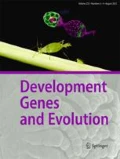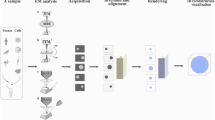Abstract
In order to facilitate in situ detection of biomolecules in large sample series the processing of whole-mount specimens has been automated. A freely programmable liquid handling system is described by which embryos or similar biological materials are processed. Possible applications include in situ hybridization (ISH), immunocytochemistry (ICC) or reporter gene assays. Process times required for the preparation of whole-mount in situ hybridizations in Drosophila, Xenopus, Gallus and in hydroids were – in part – significantly reduced as compared with manual processing. Application of automated in situ detection (AISD) in random screening is demonstrated in hydroids. Potential further applications are discussed.
Similar content being viewed by others
Author information
Authors and Affiliations
Additional information
Received: 13 May 1997 / Accepted: 27 June 1997
Rights and permissions
About this article
Cite this article
Plickert, G., Gajewski, M., Gehrke, G. et al. Automated in situ detection (AISD) of biomolecules. Dev Gene Evol 207, 362–367 (1997). https://doi.org/10.1007/s004270050124
Issue Date:
DOI: https://doi.org/10.1007/s004270050124




